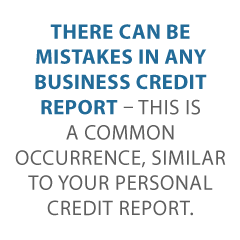This blog post may contain affiliate links, meaning when you click the links for some products and make a purchase, Credit Suite receives a commission at no additional cost to you.
Monitor Your Business Credit: Your Key to Keeping Scores High
When it comes to business credit monitoring, three significant credit reporting agencies, namely Dun & Bradstreet, Experian and Equifax offer the best services. These credit reporting bureaus take a different approach at looking into the same information.
To learn how to monitor your business credit, and to understand your business credit score, you need to look at all three credit bureaus from a monitor company. This means your Experian business credit report, your Dun & Bradstreet report, and your Equifax business credit report.
As a result, they provide a different perspective while reporting on the creditworthiness of your business. Take a look at how these three major bureaus monitor your business credit by looking at their own perspectives. For any small business, business credit monitoring should be a necessary expense. Can you monitor your own credit? Of course you can!
If you’ve ever asked, “How can I monitor my business credit?” then read on and find out.
Monitor Your Business Credit at Equifax
America’s largest small business lenders generate credit data which makes up the Small Business Finance Exchange or the SBFE. Equifax reports using this data to reflect the way owners of small business make their various loan payments including credit card payments. Due to the fact that this data directly reflects the way in which small and large business lenders interact, several banks make use of the report for evaluating the creditworthiness of your business.
Note, they do not offer an Equifax business credit report free.
Equifax Trade Credit Data
This bureau also collects all of the trade credit data and information from various public records to evaluate your business’s creditworthiness. But their report depends heavily on how your business interacts with various banks as well as different traditional lenders such as credit card providers. The Equifax company credit report database processes millions of records on a daily basis. And, only with few exceptions; it is updated monthly to make sure that it stays accurate.
Monitor Your Business Credit: Understanding Your Company’s Equifax Reports
An Equifax small business credit report shows three separate business determinations on its commercial credit reports. These are the Equifax payment index, your company’s credit risk score, and its business failure score.
Equifax Payment Index
Similar to the PAYDEX score, Equifax’s payment index, which has its measurement on a scale of 100, shows how many of your small business’s payments were made in a timely manner. These include both information from credit issuers and vendors.
But it’s not meant to anticipate future conduct. That is what the other two scores are for.
Equifax Credit Risk Score
Equifax’s credit risk score assesses how likely it is your small business will become severely delinquent on payments. Scores range from 101 to 992, and they show:
- Available credit limit on revolving credit accounts, e. g. credit cards
- Your business size
- Evidence of any non-financial transactions (e. g. merchant invoices) which are overdue or were on charge off for two or more billing cycles
- Length of time since the opening of the oldest financial account
Equifax Business Failure Score
Finally, Equifax’s business failure score looks at the risk of your company closing. It ranges from 1,000 to 1,600, evaluating these aspects:
- Total balance to total current credit limit average utilization in the previous three months
- How much time since the opening of the earliest financial account
- Your small business’s worst payment status on all trades in the previous 24 months.
- Proof of any non-financial transactions (e. g. vendor invoices) which are delinquent or have been on charge off for two or more billing cycles.
Equifax Scoring Analysis
For the credit risk and the business failure scores, a rating of 0 means bankruptcy.
An awesome Equifax score for your small business is as follows:
- Payment Index 0-10
- Credit Risk score 892-992
- Business Failure score 1400-1600
Monitor Your Business Credit at Dun & Bradstreet (D&B)
This is the only bureau for credit monitoring strictly focused on business credit. It looks into your business’s interactions with suppliers and vendors. Several potential suppliers go through the Dun & Bradstreet report on your business prior to offering credit terms. This means it is crucial for you to keep the D&B report of your business updated and accurate. D&B credit monitoring is vital. Reputable monitor companies will always cover a Dun and Bradstreet report.
D&B Reports
Dun & Bradstreet prepares 5 reports, but the 100-point PAYDEX® score is the most popular among them. D&B looks into the business-to-business data submitted by suppliers, along with the historical payment history of your business, industry data, and public records. It does this to create your business profile at Dun & Bradstreet.
D&B Predictive Scores
D&B also designs three predictive-based scores in order to predict the performance of your business in the upcoming 12 months. These include the following scores.
Supplier Risk Rating
The Supplier Evaluation Risk Rating (SER) – This rating forecasts if your business will quit delivering its services and goods.
Financial Stress Score
The Financial Stress Score – So this score forecasts if your business is likely to experience any financial distress within the upcoming 12 months.
Delinquency Predictor Score
The Delinquency Predictor Score – And this score forecasts if your business has the potential to pay all the bills within the deadline.
Dun & Bradstreet’s predictive scores look into the future by checking industry data, past performance, trade references, and your profile-based company information. You must ensure that the profile you create is accurate. It is common for simple things like a Standard Industry Classification (SIC) code to be wrong. This kind of an error can place your business at a higher risk category and make it tougher for you to get any loan.
These performance based scores represent the past performance of a business in a 24-month time period.
Monitor Your Business Credit: Understanding Your Small Business’s PAYDEX Reports
Dun & Bradstreet’s PAYDEX score ranges from 0 to 100. A PAYDEX score has a basis in payment data which is on report to the bureau. Or it is on report to data-gathering companies partnering with the agency.
D & B uses this data, in addition to a credit score and financial stress score, to advise how much credit a lender ought to extend to your small business.
Getting a PAYDEX Score
So as to get a PAYDEX score, you must file for a D-U-N-S number by way of Dun & Bradstreet’s website. The number is free, but it’s not a free business credit report. Plus the bureau needs to have reports of your payments with four or more merchants.
Your company’s PAYDEX score shows if your payments are typically made without delay or ahead of schedule. As you might expect, a greater number is better.
PAYDEX Score Details
The scores work out as follows:
- 80-100: A low risk of late payments
- 50-79: A medium risk of late payments
- 49: A high risk of late payments
Business Credit Score
Your company’s credit score ranges from 1 to 5. 1 is the very best score. This matches your small business with other businesses with comparable payment histories. The score reveals how often those small businesses pay on time.
This information can help credit issuers to grasp your business’s standing.
But it does not genuinely show all of the payment data from your small business.
Financial Stress Score
The financial stress score also runs from 1 to 5. This score matches your business with other businesses sharing similar financial and business traits.
These similarities are in areas such as size or amount of time in business. This score shows how frequently those businesses tend to pay on time. As before, 1 is the best score. This rating is a broader look at the business landscape, rather than analysis of your company’s true payment history.
A great PAYDEX score for your company is 80-100.
Monitor Your Business Credit at Experian
Many consider the Experian business credit bureau to be the most balanced business credit reporting agency. This is because they take into consideration credit information supplied by business vendors as well as lenders. Like D&B and Equifax, Experian gets data from public records and from collection agencies, credit card companies and various other databases.
Experian Scoring Methodology
Experian Business Solutions considers your business’s total credit transactions made, your company’s payment habits, and any outstanding balances. It also shows current liens details (if any), available credit for use, and bankruptcies, and judgments for checking the credit of your business. The SIC codes and the time period for which you have been in business as well as the business size – these all form part of the Experian company credit report 100-point business credit score.
Many small businesses refuse to opt for lots of trade credit, and instead depend mostly on banks. And others refuse to access capital via banks. But they depend on their terms with vendors while doing business. Hence most lenders will go through your Experian score to find out how your business reflects in both these ways. With Experian monitoring, you’ll have this information.
Experian Reports
Experian also ensures that information on your credit report does not stay indefinitely. Business Experian follows a good and standard rule of thumb. But that does not mean that all three credit bureaus generate the exact same report. Experian credit monitoring isn’t necessarily identical to information you’d get from top credit monitoring companies.
Monitor Your Business Credit: Understanding Your Company’s Experian Business Credit Reports
The Experian for business credit score report includes things like a small business credit score as well as additional details, such as account histories, payment trends, and public records. Experian commercial credit scores run from 1 to 100.
Unlike Dun & Bradstreet’s PAYDEX score and Equifax’s payment index, Experian business credit considers many factors, not just payment histories.
Experian Scoring Factors
The elements of an Experian business credit report calculation include:
- Lines of credit your business has an application for in the most recent nine months
- New lines of credit you’ve begun in the last six months
- Your company’s years in business
- Payment history in the most recent twelve months
More Experian Business Credit Score Factors
- Lines of credit in use in the last six months
- Collections totals in the previous seven years
- Percentage of available credit in use
- Amount of payments one – 30 days overdue, or 31 days or more overdue
- Number of non-net-30 lines of credit (that means the payment is due in less or greater than 30 days).
Often, even small businesses which use credit sensibly will get a medium-low risk rating. As you might expect, older businesses will have a much easier time attaining a low-risk rating.
A terrific Experian small business score is 76-100.
Correcting Errors
There can be mistakes in any business credit report. This is common, like with your personal credit report. The Fair Credit Reporting Act (FCRA) does not apply to how business credit is reported. So instead you will need to dispute in a different way. Fortunately, information from companies that monitor your credit can help.
In addition, the three credit bureaus will attempt full accuracy. So they will pay attention to a formal dispute made in the event of an error. Note: the time frame for resolving a dispute may extend for a long time period in comparison to correcting mistakes on a personal credit score. But these reporting agencies leave no stone unturned until the resolution for legitimate issues are found.
If you’re asking, “How do I contact credit reporting agencies?” here’s how.
Disputing D&B
Go to dnb.com/about-us/data-cloud.html. You must dispute by phone. Call their customer service number at: 1-800-234-DUNS (3867). For more information, go to: dandb.com/glossary/paydex.
Disputing Experian
It makes sense to use Experian credit monitoring. It’s good to watch any Experian business credit inquiry or Experian business credit checks.
Start by getting your Experian small business credit report here: businesscreditfacts.com/pdp.aspx?pg=SearchForm. You can start an online dispute here: experian.com/disputes/main.html. Or you can dispute credit monitoring Experian by email, by contacting [email protected] or [email protected].
Or you can write to:
Experian —Commercial Relations – RFR
PO Box 5001
Costa Mesa, CA 92628-5001
To call about your business Experian credit report dispute status, dial 888-211-0728. Then choose option 5.
Disputing Equifax
An Equifax business credit report dispute is pretty straightforward. Start by getting your report here: equifax.com/business/credit-information. For information on how to make an Equifax.com dispute, go here. And to get a mail in disclosure request done, go here. Check with Equifax.com/dispute status to know what’s going on.
Final Thoughts on How to Monitor Your Business Credit
If you own a small business, maintaining a proper personal credit score is crucial. But if your well-maintained personal credit score is backed by a strong and impressive business credit score, then your small business will get more opportunities for loans. Check with credit monitoring companies and get accurate information fast.
These three reporting agencies strive for accuracy. And they make every effort to ensure that only the most accurate and updated business credit report is prepared and made available for suppliers and lenders. So you can get access to the best deals when it comes to applying for a loan for your business.
If you’re asking, “Can I check my business credit score for free?” the answer is, probably not. But you can get it in conjunction with other business credit monitoring.


